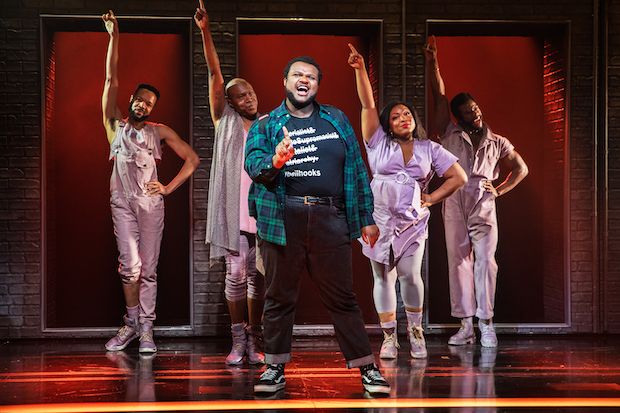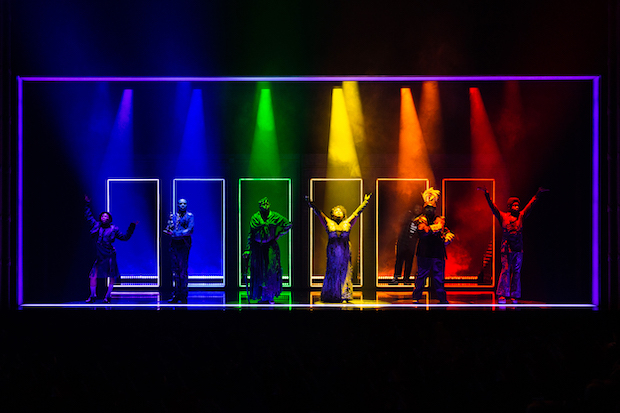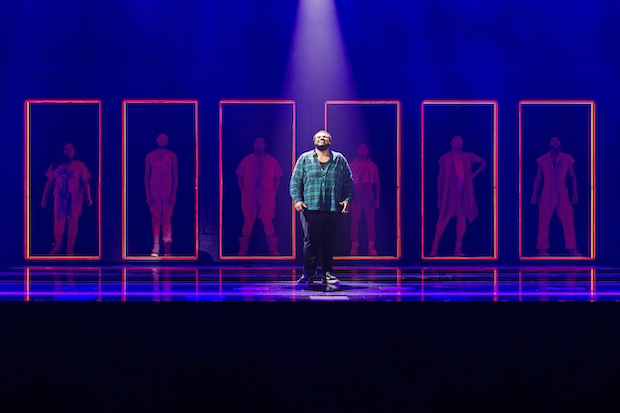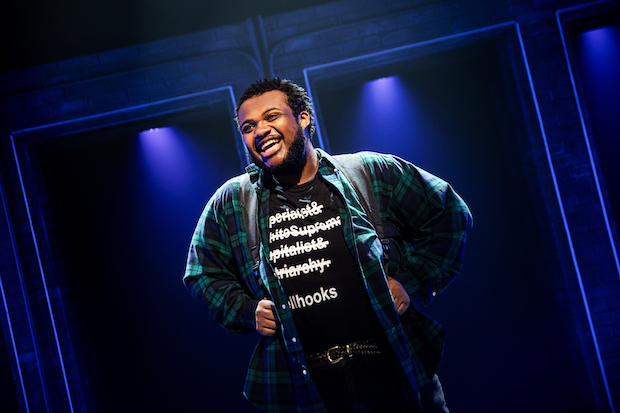Review: A Strange Loop Champions the Individual in a Culture Obsessed With Group Identity
A new voice arrives on Broadway not a moment too soon.

(© Marc J. Franklin)
In the opening moments of A Strange Loop, Michael R. Jackson's extraordinary new musical at Broadway's Lyceum Theatre, our protagonist introduces himself as "a young overweight-to-obese homosexual and/or gay and/or queer, cisgender male, able-bodied university-and-graduate-school educated, musical theater writing, Disney ushering, broke-ass middle-class politically homeless normie leftist Black American descendant of slaves who thinks he's probably a vers bottom."
It's a laugh line, but anyone who has met a new person in the last decade (especially if that meeting was online) will recognize the exaggeration of real-life behavior: Whether it's putting preferred pronouns in an e-mail signature or prefacing an opinion with "As a [insert demographic profile here]," identity has become a focal point of American culture, and perhaps the primary lens through which we view our fellow citizens. Is that a good thing? Are we checking our privilege or merely flattening ourselves into an intersection of easily processed data points? And most distressingly, do we even have the option to reject group identity when we wear it on our skin?
Jackson, who penned book, music, and lyrics, tackles these questions with exceptional flair and bracing honesty. He brings a much-needed rebel spirit to Broadway, pushing against the boundaries of acceptable discourse to show us that, like borders, they are only an illusion — a limitation on our free expression to which we all too often consent. The result is a triumphant assertion of individuality in a world that increasingly defines us by demography, largely for the purpose of selling us products and politicians. That makes A Strange Loop the best new musical of the Broadway season.

(© Marc J. Franklin)
As mentioned above, A Strange Loop is about Usher (Jaquel Spivey in a Broadway debut for the ages), who works as an usher at The Lion King to pay his rent while writing a new musical called A Strange Loop. His constant companions (more like frenemies) are his thoughts: L Morgan Lee, James Jackson Jr., John-Michael Lyles, John-Andrew Morrison, Jason Veasey, and Antwayn Hooper embody aspects of Usher's headspace (like his "daily self-loathing") while slipping into the roles of the people around him — strangers in the city and members of his own family. Usher's mother and father are none too pleased about his student loan balance, and they also hope that he'll get over his homosexual phase. They hope he can kill two birds with one stone by taking a job ghostwriting gospel plays for Tyler Perry.
We actually get to see what that would look like in a jaw-dropping scene built around the song "AIDS Is God's Punishment," in which Jackson brutally satirizes the American propensity to view illness as a sign of moral failure. This is an attitude that is not exclusive to protestant believers, as anyone who experienced the cruel judgement of the Covid years can tell you.
Jackson's incisive observations about the transactional nature of the gay dating scene, the marketability of Black suffering, and the tyranny of expectations when it comes to art and identity make A Strange Loop a worthwhile endeavor. But what makes the show truly delightful is that these ideas are set to one of the most tuneful scores to arrive on Broadway in years. I've been humming the songs daily, reliving the candid ambivalence of "Second Wave," the heartbreaking beauty of "Memory Song," and the naughty zest of "Exile in Gayville."

(© Marc J. Franklin)
I loved this show when it debuted off-Broadway, and it has only gotten better since, racking up a series of awards along the way. It has undoubtedly benefited from the committed and often outrageous performances of its ensemble, all holdovers from the off-Broadway run. These six actors can play anything and anyone and make it perfectly believable.
The one newcomer to the cast is Spivey, who is giving an electrifying performance in an incredibly demanding role. With a mischievous smile and a flash of side-eye, he instantly wins the audience over and seems to connect with us personally during several solo numbers. Much of this show takes place in a room in Usher's head, and Spivey invites us all to pull up a chair and really get to know a character who is far more interesting and complex than any demographic label could ever convey.

(© Marc J. Franklin)
As Jackson's script has been refined, Stephen Brackett's production has also gotten sharper. Arnulfo Maldonado's set is versatile enough to facilitate a fast-moving, liquid style of storytelling, as are Montana Levi Blanco's costumes. Jen Schriever lights the corners of Usher's mind to allow for transitions as rapid as a sudden thought. Raja Feather Kelly's nimble choreography endows the production with old-fashioned showmanship.
My one complaint is that the production team has not yet managed to strike the right sound balance in the Lyceum, with words regularly overpowered by the orchestra. This is a shame, because Jackson's lyrics ("Inner white girl let's have fun / In this game called fuck and run / Headless horsemen clop and fart / Be still my sleepy, hollow heart") are not to be missed.
There's something in A Strange Loop that will probably offend you; there's likely also something that will deeply resonate with you, that you didn't think could be expressed onstage, but is now being shared nightly with an audience of 922 souls — and isn't that worth the cost of being momentarily offended?
My advice is to buy tickets now, because it's going to get a lot harder once A Strange Loop wins the Tony for Best Musical.









